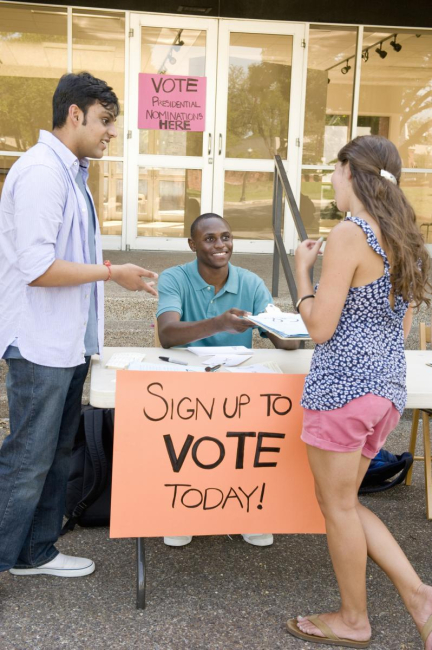You have /5 articles left.
Sign up for a free account or log in.

Yellow Dog Productions/Photodisc/Getty Images
In 2020, young people across all political parties turned out in one of the highest showings of youth voter participation our nation has ever seen, something experts called a major factor in the outcome of the presidential election. But the fact is, in spite of that progress—youth voter participation increased by 11 percentage points between 2016 and 2020—only half of all eligible young people voted in the 2020 election.
While young voters should be able to cast a ballot as easily as any other voter, as the newest members of our democracy, our paths to voting are riddled with some of the most difficult and unique barriers to registration and voting there are. College students move more frequently than older Americans. We’re less likely to have driver’s licenses or other identification documents needed to fulfill strict voter ID requirements. And many of our campuses fail to share the information we need about registration deadlines, polling locations or transportation options. Attending a university of over 50,000 students, I know firsthand what an uphill battle it is for colleges to reach out to their entire campus communities and let all of their students know how, where and why they should vote.
More than 51 years ago, the 26th Amendment granted 18-year-olds in the United States the right to vote, with the intention of making our democracy more inclusive and representative of the people it serves. But in the face of unprecedented efforts by politicians to maintain power by making it harder for college students and other young people to vote, its promise remains unfulfilled.
Recently, Senator Elizabeth Warren of Massachusetts and Representative Nikema Williams of Georgia introduced a new piece of legislation—the Youth Voting Rights Act—that is critical for young people across the country. The bill would take concrete action to combat the most significant barriers to registration and voting, making the process significantly more accessible for students like me. It requires public higher education institutions to host on-campus polling places, expands voter registration opportunities at public colleges, protects the use of student IDs to meet voter identification requirements for federal elections in all states, allows young people in every state to preregister to vote before turning 18 and much more.
This bill is essential to protecting our rights as American citizens, especially as states like Arizona—where conspiracy theories led to a partisan “audit” of the 2020 election results despite no evidence of voter fraud—push voter suppression bills attacking mail-in voting and restricting voter registration. By creating a private right to take legal action against age discrimination in voting access, the bill is crucial to righting the fundamental trajectory of our democracy.
As a youth voting rights advocate on my own campus, and a member of the Campus Vote Project’s national Student Advisory Board, I know how the passage of this legislation would impact people on my campus who struggle with voting, despite their deep motivation to cast a ballot. Amid a sea of misinformation online, students wouldn’t have to scramble for accurate information when approaching voter registration deadlines, or figure out their own transportation to polls that are far away from campus, or be denied the opportunity to vote simply because they don’t have a driver’s license. For many of us, on top of demanding classes, homework, jobs and family commitments, these barriers pose major obstacles to our ability to cast a vote. Having an additional array of options, like preregistration before turning 18, would help incentivize future generations to vote even before they disperse to the workforce or to higher education. Such changes will likely be particularly helpful in encouraging students and other young people from marginalized communities to vote.
Students and other young people are a formidable constituency, and we deserve fair representation. As we mark another Election Day, it’s critical for our elected officials to come together—across political parties—to live up to the ideals that our nation was founded on and pass this critical legislation that would unleash my generation’s political power.



